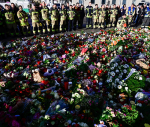You are here
Biden administration blackmailed by Israeli government
Jun 01,2022 - Last updated at Jun 01,2022
The Biden administration is being blackmailed by the present Israeli government and pro-Israel US legislators and lobbyists who oppose US reentry into the 2015 agreement limiting Iran's nuclear programme in exchange for lifting sanctions. "Blackmail" is the appropriate term in this case because it is clear that the administration needs the votes of Israeli-aligned US lawmakers pass legislation.
Instead of promptly honouring his election campaign pledge to return to the deal, known as the Joint Comprehensive Plan of Action (JCPOA), President Joe Biden has made demands unacceptable to Iran as the price of UN compliance, stalling negotiations for months and putting the JCPOA at risk. Consequently, he has come under pressure from Britain, France, Germany, Russia and, to a lesser extent, China to quit stalling and return to the moribund JCPOA before it dies of neglect.
Having reached accommodation on nearly all issues, returning to the JCPOA has been threatened by an issue outside its purview: Biden's refusal to lift the "terrorist" designation imposed on Iran's Revolutionary Guard Corps, that country's armed forces. The 2019 designation and the 2018 US withdrawal from the JCPOA and legacies of the Trump administration. Unfortunately, on policies impacting this region Biden has been wedded to Donald Trump's malign handiwork concerning Israel, Palestine, Syria, Iraq, Lebanon and Iran.
While both the Israeli governments of Binyamin Netanyahu and Naftali Bennet have taken a destructive hard-line on the JCPOA, Israeli intelligence figures and generals have disagreed and argued for its retention.
The latest is former military intelligence chief Tamir Hayman who, last weekend, argued on Israeli television that return to a deal was preferable to no deal. He said that a "framework of agreements" was the 'least bad' option for Isra el at the moment". He pointed out that Iran's capabilities have grown since the US existed the JCPOA although Tehran has not come close to building a bomb. "In 2015 when the deal was signed we thought it was a problematic deal, but the reality today is completely different from 2015,” he stated.
Before Hayman made his television appearance, it was revealed that Reserve Brig. Gen. Dror Shalom, who heads the military's politico-military bureau, told Biden administration officials Trump made a mistake by withdrawing the US from the JCPOA. Shalom has long held this view.
Despite such comments from influential Israelis, the Israeli government and its hard-line acolytes in the US continue to push pusillanimous Biden to dump the deal. This led the US chief envoy to the Vienna talks, Robert Malley, on reviving the JCPOA to report to the Senate Foreign Relations Committee that prospects for US return to the deal are "tenuous at best".
His assessment coincided with fresh US Treasury sanctions on Iraq targeting "an international oil smuggling and money laundering network led by Islamic Revolutionary Guard Corps-Quds Force... officials that has facilitated the sale of hundreds of millions of dollars' worth of Iranian oil for [the benefit of the Guard] and Hizbollah."
However, Malley demonstrated a tiny bit of defiant courage when he stated, "The simple fact is this: As a means of constraining Iran's nuclear programme, the JCPOA was working. Leaving it has not," Malley said.
He is right. Iran waited for more than a year to respond to Trump's abandonment of the JCPOA by reducing compliance gradually by enriching uranium to a higher level of purity than the 3.67 limit set by the deal, amassing a far greater stockpile than permitted, manufacturing and deploying more advanced centrifuges for enrichment, and restricting the monitoring activities of the International Atomic Energy Agency. Iraq argued that the steps it took were in line with the provisions of the JCPOA which deal with non-compliance of a signatory.
After Trump pulled out of the JCPOA in May 2018 and over time imposed 1,500 sanctions on Iran. Tehran waited for more than a year for European signatories of the deal, in particular, to lift sanctions, invest and do business in Iran. This did not happen because the US threatened to slap secondary sanctions on governments, companies and individuals that dealt with Iran. This amounted to another major violation of the JCPOA as the US had pledged not to interfere with the activities of others who sought to trade with and invest in Iran.
Consequently, the volume of Iran's oil exports fell depriving the government of revenue. Iran could not obtain foodstuffs, medicine and medical equipment needed by the population, including the COVID crisis, Iran's other exports fell, and the country's economy shrank.
If the US does not return to the JCPOA, Iran could very well retaliate militarily and politically. Indeed, Iran has demonstrated that it will retaliate. Iran has repeatedly fired missiles at US targets in Erbil, the capital of Iraq's Kurdish region while Iranian-allied Shia militias have struck Iraqi military bases hosting US forces.
Last week, Iraq's parliament approved a new law criminalising normalisation with Israel and prescribing prison time and execution for those who advocate such a policy. This law, passed by 275 votes in the 329 Iraqi national assembly, is the sole piece of legislation adopted since the new parliament met in January. Since then, divided deputies have been unable to choose a president who will select a prime minister to form the next government.
The anti-Israel law was proposed by Muqtada al-Sadr, whose party won the most seats in last October's election, and supported by rival Shia parties attached to pro-Iranian militias. The law was meant to demonstrate that Sadr's party will not join forces with Kurish or Sunni figures who might have covert ties to Israel and to warn the Kurdish Democratic Party, which governs the Kurdish region, not to promote relations with Israel. Last September, Erbil was sharply criticised for hosting a conference on this subject while a leading Kurdish businessman has been accused of covertly selling oil to Israel.












